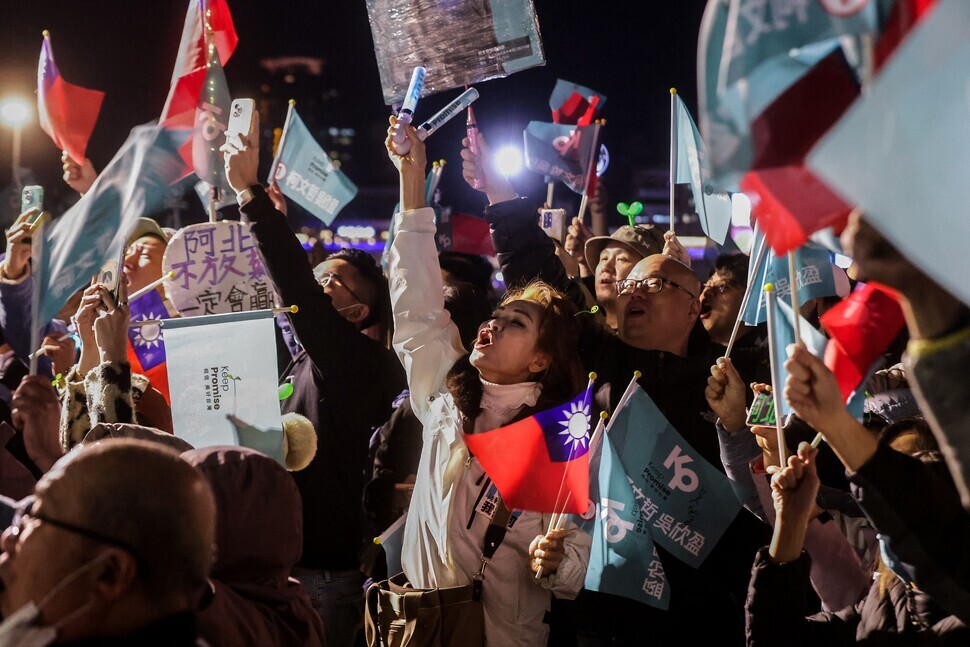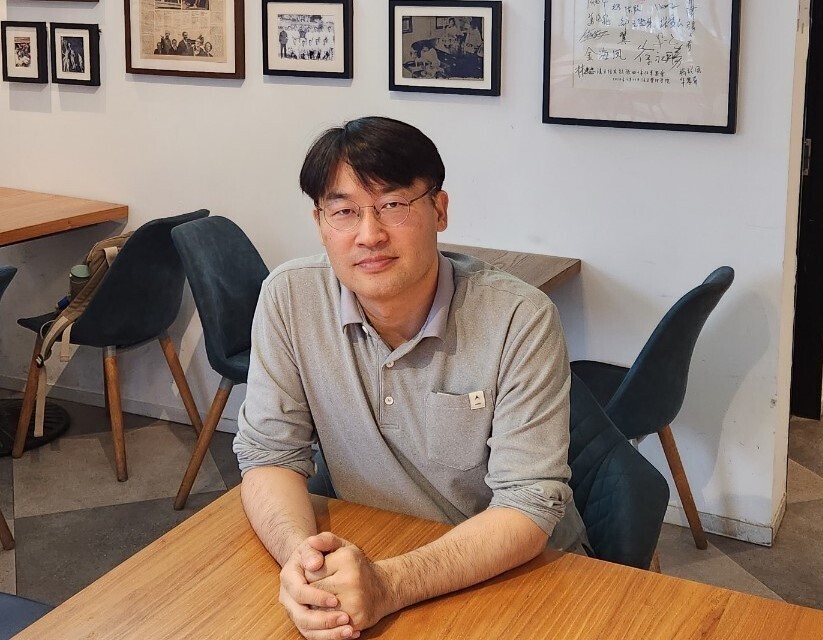hankyoreh
Links to other country sites 다른 나라 사이트 링크
[Interview] No candidate for Taiwanese president can be considered pro-Beijing, says scholar

“The Taiwanese presidential election has been impacted by the events in Hong Kong in 2019. As a result, none of the candidates are pro-Beijing.”
Analysts for major global news media have described the upcoming presidential election in Taiwan on Saturday as a proxy fight between the US and China, a conflict between pro-US and pro-Beijing forces, and a stress test for the world order. They assume the results of this election will have a major impact not only on cross-strait relations but also on US-China relations as a whole.
But political scientist Chang Young-hee, a long-time student of Taiwanese politics who received his doctorate in Taiwan, remarked that simplistic expressions of this sort “detract from an accurate understanding of the Taiwanese election and political situation.”
“Cross-strait relations will be determined by the US election in November,” he said.
The Hankyoreh sat down with Chang, who is currently a researcher at the Research Institute for Peace and Security Studies at Chungnam National University, for an interview in Taipei, the capital of Taiwan, on Wednesday afternoon.
Hankyoreh: This election is a three-way race between Lai Ching-te with the Democratic Progressive Party (DPP), Hou Yu-ih with the opposition Kuomintang (KMT), and Ko Wen-je with the Taiwan People’s Party. What are they each running on?
Chang: The DPP is framing this election as a choice between democracy and dictatorship, and the KMT as a choice between war and peace. Since direct elections were instituted in 1996, the chief question in Taiwan’s presidential election has been how to approach relations with China, and this election is no different.
Significantly, this election is taking place in the wake of the 2019 Hong Kong protests. Taiwanese people consider violence very repugnant, and Taiwanese society was shocked by the Chinese police force’s brutal crackdown on Hong Kong civil protesters. Dislike of China’s idea of “one nation, two systems” has grown very strong. That’s also why Taiwanese President Tsai Ing-wen, whose approval rating was in the low 20s, managed to be reelected with close to 60% of the vote in January 2020.
While the economy and jobs are both important, Taiwan’s current economic situation isn’t bad, and they don’t seem to be becoming major issues.
Hankyoreh: What do the people of Taiwan want from relations with China?
Chang: That’s a little complicated. While the Taiwanese don’t take China’s military bluster as seriously as one might think, they don’t want the current tensions to continue either. Dialogue with China has been completely cut off during Tsai’s eight years in office. The general opinion in Taiwan is that a certain amount of dialogue is needed in the event of unexpected developments.
Furthermore, the Taiwanese think the status quo needs to be maintained. Dialogue with China may be necessary, but they don’t seem to want more aggressive exchange and cooperation. The Hong Kong protests have caused antipathy for China to rise, and China’s economic appeal also seems to have dimmed because of the economic downturn that began during the pandemic.
Hankyoreh: Aren’t both Hou and Ko calling for more economic exchange with China?
Chang: They want to grow the economy through more exchange with China, but they’re not convincing the public. The people of Taiwan want enough dialogue to convince China to exercise restraint militarily and on the level of security.
Hankyoreh: Many media outlets are describing this election as a “proxy fight” between the US and China. Does that ring true?
Chang: If that were the case, the DPP and the KMT ought to be taking sides with either the US or China in their dispute. But while the KMT is often seen as siding with China, it too should be considered as being on the American side.
There has been absolutely no room for pro-Beijing rhetoric or pro-Beijing groups in Taiwan since the 2019 Hong Kong protests. All three candidates have made a point of emphasizing to the public that they have the US’ backing and aren’t pro-Beijing candidates. Given that, any talk of a proxy conflict between the US and China doesn’t accurately reflect the facts.

Hankyoreh: Shouldn’t Hou, the KMT candidate, be regarded as pro-Beijing?
Chang: After receiving the party’s nomination last year, Hou visited the US in September in an attempt to show he had the US’ blessing. Not once in his life has he ever been to China. He earned his stripes in the police force. Some think that one reason Hou gained the nomination despite not being a major politician is that he was the least likely to be attacked as being pro-Beijing.
It’s more accurate to say that the KMT is a group that supports exchange and cooperation with China. I suppose that might be called pro-Beijing, but the KMT places even more importance on relations with the US. A candidate that doesn’t have the US’ blessing has virtually no chance of winning a presidential election in Taiwan.
Hankyoreh: Then what do you make of the fact that the US wants the DPP to win while China is hoping for the KMT to pull through?
Chang: In that respect, at least, this election can be seen as a US-China proxy fight. The US’ greatest priority is sustaining its strategy for the Indo-Pacific. Given the US’ strategy of containing China not by itself, but alongside its allies, a KMT victory could make Taiwan the weakest link.
The US wants Lai Ching-te, who is regarded as a hard-line advocate of Taiwanese independence, to maintain the current administration’s policy. In contrast, China prefers a KMT victory, given that party’s support for exchange and cooperation. The election of a KMT candidate is the only way Chinese President Xi Jinping can tout the success of his Taiwan policy over the past eight years.
Hankyoreh: How would cross-strait relations change if the KMT returned to power?
Chang: That would mean the resumption of dialogue, which has been suspended for eight years. The two sides could talk about the economic benefits that China can offer Taiwan, including the Cross-Strait Service Trade Agreement, an initiative that failed under former President Ma Ying-jeou. Nevertheless, [Hou] would have to take into account the Taiwanese public’s distrust of China. Dialogue between the KMT and the Chinese authorities wouldn’t be easy.
If the DPP remains in power, China may exert powerful military pressure, but it will wait for the outcome of the US presidential election in November. The US and China agreed to “manage” their competition in a summit in San Francisco last November, and they’re repairing lines of communication. Cross-strait crises derive from US-China relations, and the power to manage those crises is also found in US-China relations. That’s the basic dynamic of cross-strait relations.
Hankyoreh: What is Korea’s role in connection with the Taiwanese election?
Chang: In fact, there’s not much it can do. That said, Korea shouldn’t goad China on the Taiwan issue. It’s a very volatile issue. Nobody knows how the US’ position might change after the November election. You shouldn’t gamble when the future is murky.
Korea also needs to adjust its perspective on China. We need a better understanding of Xi Jinping’s actions toward Taiwan. China’s behavior ought to be seen as a kind of bluff. China doesn’t have the military preparations or the economic conditions to make some kind of bold move toward reunifying the country by force.
Xi’s rise and his long-term hold on power are products of the Chinese system and the Chinese crisis. He doesn’t have the capacity to overcome that system himself. The greatest priorities for the Xi administration are remaining in power and maintaining the supremacy of the Chinese Communist Party. They won’t be eager to take on any uncertainty that impedes those priorities.
By Choi Hyun-june, Beijing correspondent
Please direct questions or comments to [english@hani.co.kr]

Editorial・opinion
![[Editorial] Intensifying US-China rivalry means Seoul must address uncertainty with Beijing sooner than later [Editorial] Intensifying US-China rivalry means Seoul must address uncertainty with Beijing sooner than later](https://flexible.img.hani.co.kr/flexible/normal/500/300/imgdb/original/2024/0517/8117159322045222.jpg) [Editorial] Intensifying US-China rivalry means Seoul must address uncertainty with Beijing sooner than later
[Editorial] Intensifying US-China rivalry means Seoul must address uncertainty with Beijing sooner than later![[Column] When ‘fairness’ means hate and violence [Column] When ‘fairness’ means hate and violence](https://flexible.img.hani.co.kr/flexible/normal/500/300/imgdb/original/2024/0516/7417158465908824.jpg) [Column] When ‘fairness’ means hate and violence
[Column] When ‘fairness’ means hate and violence- [Editorial] Yoon must stop abusing authority to shield himself from investigation
- [Column] US troop withdrawal from Korea could be the Acheson Line all over
- [Column] How to win back readers who’ve turned to YouTube for news
- [Column] Welcome to the president’s pity party
- [Editorial] Korea must respond firmly to Japan’s attempt to usurp Line
- [Editorial] Transfers of prosecutors investigating Korea’s first lady send chilling message
- [Column] Will Seoul’s ties with Moscow really recover on their own?
- [Column] Samsung’s ‘lost decade’ and Lee Jae-yong’s mismatched chopsticks
Most viewed articles
- 1[Editorial] Transfers of prosecutors investigating Korea’s first lady send chilling message
- 2For new generation of Chinese artists, discontent is disobedience
- 3[Photo] 1,200 prospective teachers call death of teacher “social manslaughter”
- 4S. Korea “monitoring developments” after report of secret Chinese police station in Seoul
- 5Xi, Putin ‘oppose acts of military intimidation’ against N. Korea by US in joint statement
- 6[Exclusive] Unearthed memo suggests Gwangju Uprising missing may have been cremated
- 7[Column] Samsung’s ‘lost decade’ and Lee Jae-yong’s mismatched chopsticks
- 8[Special reportage- part I] Elderly prostitution at Jongmyo Park
- 9Chun Doo-hwan arrived in Gwangju by helicopter before troops opened fire on civilians
- 10[Interview] Recalling seeing soldiers secretly burying bodies behind Gwangju Prison